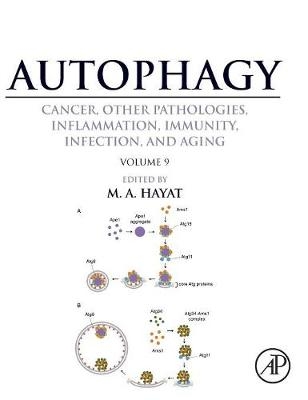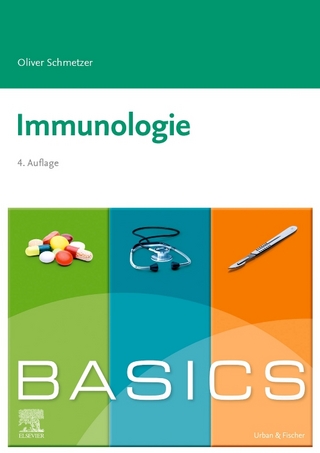
Autophagy: Cancer, Other Pathologies, Inflammation, Immunity, Infection, and Aging
Academic Press Inc (Verlag)
978-0-12-802936-7 (ISBN)
Volume 9 emphasizes the role of autophagy in diseases, such as leukemia, antifungal and antibacterial immunity, and transplantation. This volume also explains, in detail, the molecular mechanism(s) underlying the formation of autophagosomes, including the progression of omegasomes to autophagosomes. This information is important because one of the major functions of autophagy is to degrade and eliminate excessive, old, and harmful materials from the cell. Autophagosomes receive these materials (cellular cargo) and transport them to lysosomes for degradation. Lysosomes contain the digestive enzymes (hydrolases) that breakdown proteins, lipids, carbohydrates, etc. (self-digestion).
To further explain this phenomenon, the role of the endoplasmic reticulum (ER) in the formation of autophagosomes is discussed. ULK1 and Beclin 1 proteins are also important in the initial formation of autophagosomes, and are also discussed. Because much of the early research in this area was carried out using yeast cells, the role of Golgi complex in the autophagosome formation in these cells is explained.
This volume also includes an explanation of the role of the autophagy-related gene ATG5 in cancer (e.g., gastrointestinal cancer). Paradoxically, autophagy is a “double-edged sword because it eliminates some pathogens, whereas it can be used by some intracellular pathogens to multiply and cause infection. This book is an asset to newcomers, providing a concise overview of the role of autophagy in necrosis and inflammation, while also serving as an excellent reference for more experienced scientists and clinicians.
Dr. Hayat has published extensively in the fields of microscopy, cytology, immunohistochemistry, immunocytochemistry, and antigen retrieval methods. He is Distinguished Professor, Department of Biological Sciences, Kean University, Union, New Jersey, USA.
Part I: Molecular Mechanisms
Chapter 1. Overview of Autophagy
Chapter 2. Autophagic Structures in Yeast
Chapter 3. Mitophagy: Sensors, Regulators, and Effectors
Chapter 4. Regulation of Autophagy by Actin-Associated Signaling Pathways
Chapter 5. G2019S Mutation of LRRK2 Increases Autophagy via MEK/ERK Pathway
Chapter 6. Cargo Proteins Facilitate the Formation of Transport Vesicles, but not Autophagosomes
Chapter 7. Absence of Bax and Bak: Implications for Autophagy and Alternative Mitochondrial Functions
Chapter 8. The Antiapoptotic Protein BCL-2 Has Also an Antiautophagy Role Through Beclin 1 Inhibition
Chapter 9. Organic Pollutant Perfluorooctane Sulfonate–Induced Lysosomal Membrane Permeabilization Blocks Autophagy Flux in Human Hepatoma Cells
Part II: Autophagy and Cancer
Chapter 10. Mutant p53 Located in the Cytoplasm Inhibits Autophagy
Chapter 11. Role of Autophagy in Regulation Survival or Death of Cancer Cells
Chapter 12. Regulation of Autophagy in Chronic Lymphocytic Leukemia: The Role of Histone Deacetylase Inhibitors
Chapter 13. Improving the Survival of Mesenchymal Stromal Cells Against Oxidative Stress in Transplantation: Role of Autophagy Induction
Part III: Autophagy and Infection
Chapter 14. Low-Density Lipoprotein Receptor-Related Protein-1 Mediates Vacuolating Cytotoxin-Induced Autophagy and Apoptosis During Helicobacter pylori Infection
Chapter 15. Cytomegalovirus Blocks Autophagy During Infection of the Retinal Pigment Epithelial Cells: Functional Relationship Between Autophagy and Apoptosis
Chapter 16. Unusual Functions for the Autophagy Machinery in Apicomplexan Parasites
Chapter 17. Subversion of Innate Phagocytic Cells by Orientia tsutsugamushi
Chapter 18. Intracellular Bacterium Anaplasma phagocytophilum Induces Autophagy by Secreting Substrate Ats-1 that Neutralizes the Beclin 1-ATG14L Autophagy Initiation Pathway
Chapter 19. Host Autophagy in Antifungal Immunity
| Erscheinungsdatum | 14.06.2016 |
|---|---|
| Verlagsort | San Diego |
| Sprache | englisch |
| Maße | 191 x 235 mm |
| Gewicht | 1040 g |
| Themenwelt | Medizin / Pharmazie ► Medizinische Fachgebiete ► Onkologie |
| Studium ► Querschnittsbereiche ► Infektiologie / Immunologie | |
| ISBN-10 | 0-12-802936-6 / 0128029366 |
| ISBN-13 | 978-0-12-802936-7 / 9780128029367 |
| Zustand | Neuware |
| Haben Sie eine Frage zum Produkt? |
aus dem Bereich


